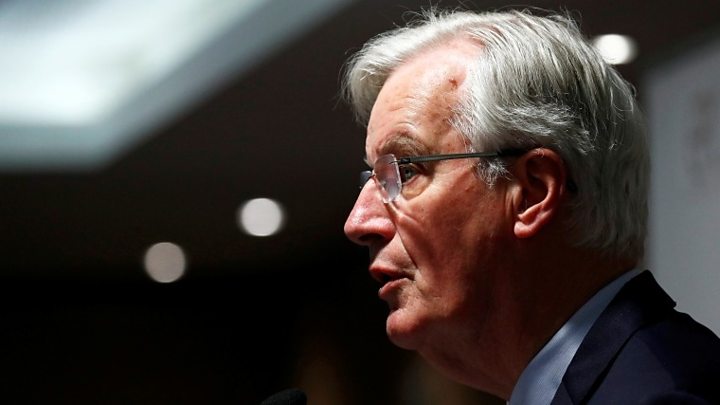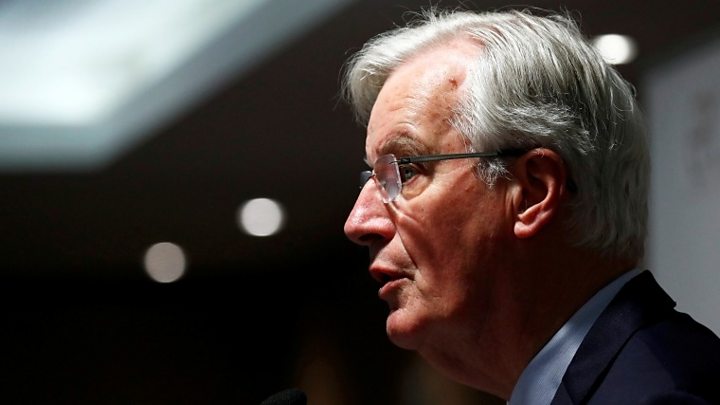News Updates
MPs push to prevent no-deal Brexit in law
http://www.bbc.co.uk/news/uk-politics-47789298

Media playback is unsupported on your device
A cross-party group of MPs has put forward a bill to prevent a no-deal Brexit in 10 days’ time.
If passed into law, the bill would require the PM to ask for an extension of Article 50 – which mandates the UK’s exit date from the EU – beyond the current 12 April deadline.
Labour MP Yvette Cooper presented the bill for debate on Wednesday.
Meanwhile, the EU’s chief negotiator has said a no-deal Brexit is now more likely but can still be avoided.
Michel Barnier said a long extension to the UK’s 12 April exit date had “significant risks for the EU” and a “strong justification would be needed”.
Tory MP Sir Oliver Letwin, who supports Ms Cooper’s bill, said: “This is a last-ditch attempt to prevent our country being exposed to the risks inherent in a no-deal exit.
“We realise this is difficult. But it is definitely worth trying.”
Ms Cooper said the UK was “in a very dangerous situation” and MPs “have a responsibility to make sure we don’t end up with a catastrophic no deal”.
Speaking to BBC Radio 4’s World At One, she added: “We have been attempting to squeeze into just a couple of days a process that really should have been happening for the last two years – a process of trying to build a consensus around the best way forward.
“It is what the prime minister should be doing. It is the prime minister’s responsibility to ensure we don’t leave the country less safe.”
In March, MPs voted against leaving the EU without a deal, but it was not legally-binding.
Why is this bill unusual?
Image copyright
AFP/Getty Images
Normally the government chooses which bills to present to Parliament in order for them to become law.
But – much to the government’s disapproval – MPs voted to allow backbenchers to take charge of business in the Commons on Wednesday.
This gives backbenchers the opportunity to set aside more time on Thursday, which could be used to pass the bill into law, as they will be in charge.
The bill would need to go through the usual process before it becomes law – including being agreed by the House of Lords and receiving Royal Assent.
Brexiteer Tory Sir Bill Cash said trying to go through these stages in one day made it a “reprehensible procedure”.
But Speaker John Bercow said that, while it was “an unusual state of affairs”, it was “not as unprecedented as he supposes” – citing recent bills on Northern Ireland that have been passed at the same speed.

Real Life. Real News. Real Voices
Help us tell more of the stories that matter
Become a founding member
BBC political editor Laura Kuenssberg said a third set of so-called indicative votes could still take place alongside this process, but the focus of the cross-party group was now approving the bill – with the hope that it will pass on Thursday.
Elsewhere, the BBC’s John Pienaar said Theresa May’s cabinet has considered plans to “ramp up” no-deal Brexit preparations. A snap general election was also discussed.
In the latest round of indicative votes on Monday, MPs voted on four alternatives to the PM’s withdrawal deal, but none gained a majority.
MPs rejected a customs union with the EU by three votes. A motion for another referendum got the most votes in favour, but still lost.
The votes were not legally binding, but they had been billed as the moment when Parliament might finally compromise.
Earlier, Mr Barnier said: “No deal was never our desire or intended scenario but the EU 27 is now prepared. It becomes day after day more likely.”
He told the European Parliament’s foreign affairs committee that “things are somewhat hanging on the decisions of the House of Commons”, and that the deal was negotiated with the UK “not against the UK”.
“If we are to avoid a no-deal Brexit, there is only one way forward – they have got to vote on a deal.
“There is only one treaty available – this one,” he said, waving the withdrawal agreement.

Media playback is unsupported on your device
Mrs May’s plan for the UK’s departure has been rejected by MPs three times.
Last week, Parliament took control of the process away from the government in order to hold a series of votes designed to find an alternative way forward.
Eight options were put to MPs, but none was able to command a majority, and on Monday night, a whittled-down four were rejected too.
What next?
- Tuesday 2 April: A five-hour cabinet meeting
- Wednesday 3 April: Potentially another round of indicative votes, and Yvette Cooper’s bill to be debated
- Thursday 4 April: Theresa May could bring her withdrawal deal back to Parliament for a fourth vote, while MPs could also vote on Ms Cooper’s bill
- Wednesday 10 April: Emergency summit of EU leaders to consider any UK request for further extension
- Friday 12 April: Brexit day, if UK does not seek / EU does not grant further delay
- 23-26 May: European Parliamentary elections



